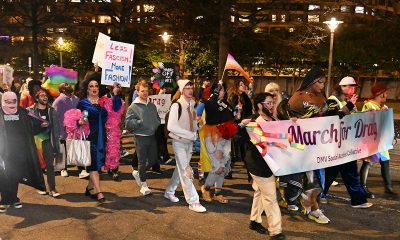News
Grenell emails hint at initial steps in Trump effort to decriminalize homosexuality
State Dept. identified 10 countries for int’l efforts
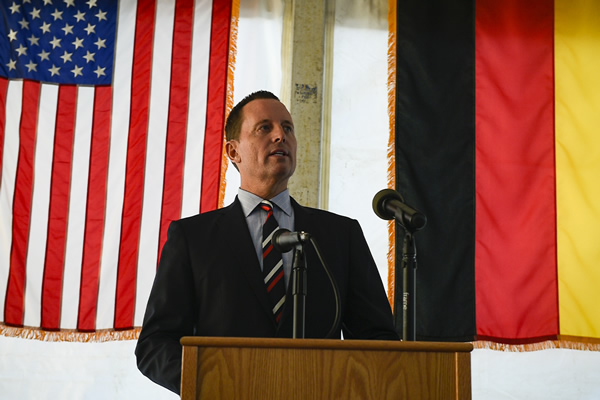
Emails from the State Department — obtained by the Washington Blade from a lawsuit filed under the Freedom of Information Act — reveal the Trump administration had at least laid the preliminary groundwork for a global campaign to decriminalize homosexuality to the extent of identifying 10 countries where it was thought most possible.
The initial seven-page batch of emails, obtained by the FOIA lawsuit seeking communications from former U.S. Ambassador Richard Grenell in his capacity as leader of the initiative to decriminalize homosexuality, was delivered to the Blade last month and hints at initial steps toward a plan shortly after the announcement of the initiative.
It’s unclear from the initial production what further efforts, if any, sprang from the identification of these 10 countries. Critics at the time said the campaign was nothing but window-dressing to cover up for anti-LGBTQ policies during the Trump administration.
In an exchange dated Aug. 23, 2019, an assistant to Grenell forwards an email from an individual whose identity is redacted on an edited list of 10 countries where “we believe decriminalization is possible.” Copied on the email is Robin Quinville, who was deputy chief of mission in Berlin.
“Per your request, attached and edited below is the list of 10 countries where LGBTI decriminalization is possible — with your and Robin’s edits incorporated,” the email is redacted.
The names of the 10 countries, however, are redacted in the exchange provided to the Blade, as is an apparent Word document attached in the exchange with a short justification for each of the countries. Also redacted are the names of two agencies an assistant in the email identifies as having “cleared” the list.
The assistant tells Grenell the State Department’s Bureau of Democracy, Human Rights and Labor hasn’t yet responded, but the embassy “will forward their list when we receive it.”
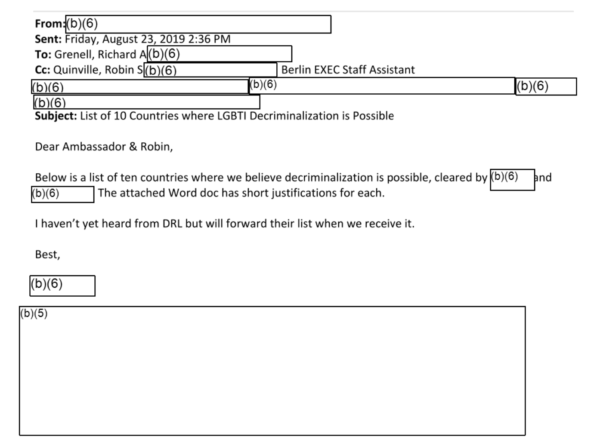
As a result of the redactions, the identity of the 10 countries is unknown at this time. The early production given the Blade in response to a FOIA request filed in September 2020 offers no indication on the extent to which the State Department conducted further efforts to change the law in these countries, or whether there was any engagement after identifying them.
Grenell didn’t respond to the Blade’s request for comment for this article on how the identification of these 10 countries informed efforts to decriminalize homosexuality. Quinville couldn’t be reached for comment.
The initial FOIA production also includes an earlier exchange between an assistant and Grenell dated June 11, 2019, shortly after Botswana became the latest country to decriminalize homosexuality, forwarding a link to a Washington Post article on that news. The name of the assistant is redacted and may or may not be the same as the one in the other exchange.
“Some good news coming out of Botswana! Their High Court ruled today that parts of the penal code criminalizing same-sex conduct are unconstitutional,” the unidentified assistant writes.
Grenell is short in his reply: “I just tweeted about it.” It’s not clear whether or not Grenell contributed to the decriminalization efforts in Botswana other than the tweet he references. The assistant goes on to share a link from a tweet from the State Department spokesperson congratulating Botswana.
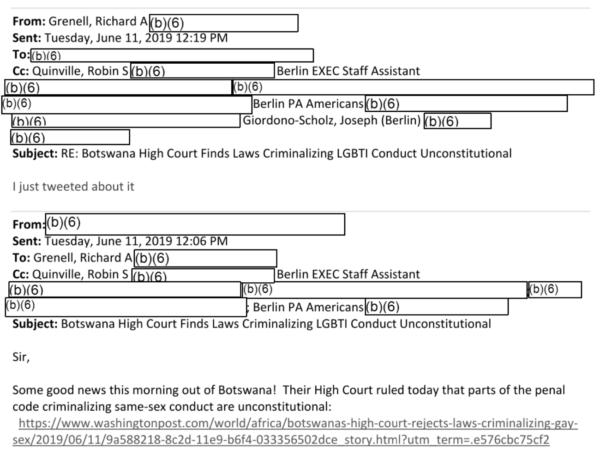
Other countries addressing the criminalization of homosexuality after the Trump administration’s initiative was announced were Gabon, which became one of the few countries in sub-Saharan Africa to decriminalize homosexuality, and Sudan, which eliminated the death penalty as punishment for homosexual conduct (although the punishment remains prison time from five years to life).
There’s no evidence those changes happened as a result of the global initiative Grenell led. One of the aims of the Blade’s FOIA lawsuit is to shed light on any activity from the U.S. government during the Trump administration in assisting with efforts, successful or otherwise, to decriminalize homosexuality.
The redactions on the production in the FOIA lawsuit may not be the last word. FOIA was amended in 2016 to clarify federal agencies cannot redact deliberative language without demonstrating revealing that information would cause “foreseeable harm.” The Blade, represented by attorneys at Davis Wright Tremaine, LLP, will have the opportunity to challenge these redactions once the FOIA production is complete.
At the time the lawsuit was filed, the State Department cited a “sizable universe of potentially responsive records” numbering in the thousands of pages as a reason for being unable to produce the records in a more timely manner. The initial seven pages produced by the State Department are an extremely small percentage of that total.
An unnamed State Department official, in response to an inquiry submitted by the Blade’s attorneys on the reasons for the initial limited production, fell back on the ongoing coronavirus pandemic and overwhelming nature of the work, citing a need to consult “subject matter experts” before disclosing potentially sensitive material.
“That process can take considerable time, particularly given the substantial constraints that have been imposed by the ongoing COVID-19 pandemic,” the State Department response says. “Thus, it’s not necessarily the case that the size of the potentially responsive universe returned by your client’s request should dictate the size of State’s first production. Similarly, a small production set does not necessarily entail that State has not processed a sizeable number of records during the preceding processing cycle.”
The Blade, through its attorneys, has asked the State Department to determine how much of the “sizable universe” has been reviewed and determined to be responsive or non-responsive (“fully processed”) and how long would the process involving subject matter experts take.
Daniel Fiedler, representing the Blade in the FOIA lawsuit as an attorney with Davis Wright Tremaine LLP, said the initial production from the State Department was unsatisfactory.
“In December, the Department of State made its first production in response to the FOIA request submitted by the Washington Blade over a year ago,” Fiedler said. “This nominal production consisted of two email records, both heavily redacted. Such a token response after so much time is truly disheartening, and we will continue to push to ensure that the Department satisfies its obligations under FOIA.”
Fiedler concluded: “The American public is entitled access to the records sought, and every additional day without that access causes further harm.”
U.S. Military/Pentagon
Pentagon urged to reverse Naval Academy book ban
Hundreds of titles discussing race, gender, and sexuality pulled from library shelves

Lambda Legal and the Legal Defense Fund issued a letter on Tuesday urging U.S. Defense Secretary Pete Hegseth to reverse course on a policy that led to the removal of 381 books from the Nimitz Library of the U.S. Naval Academy in Annapolis, Md.
Pursuant to President Donald Trump’s executive order 14190, “Ending Radical Indoctrination in K-12 Schooling,” the institution screened 900 titles to identify works promoting “diversity, equity, and inclusion,” removing those that concerned or touched upon “topics pertaining to the experiences of people of color, especially Black people, and/or LGBTQ people,” according to a press release from the civil rights organizations.
These included “I Know Why the Caged Bird Sings” by Maya Angelou, “Stone Fruit” by Lee Lai, “The Hate U Give” by Angie Thomas, “Lies My Teacher Told Me: Everything Your American History Textbook Got Wrong” by James W. Loewen, “Gender Queer: A Memoir” by Maia Kobabe, and “Democracy in Black: How Race Still Enslaves the American Soul” by Eddie S. Glaude, Jr.
The groups further noted that “the collection retained other books with messages and themes that privilege certain races and religions over others, including ‘The Clansman: A Historical Romance of the Ku Klux Klan’ by Thomas Dixon, Jr., ‘Mein Kampf’ by Adolf Hitler, and ‘Heart of Darkness’ by Joseph Conrad.
In their letter, Lambda Legal and LDF argued the books must be returned to circulation to preserve the “constitutional rights” of cadets at the institution, warning of the “danger” that comes with “censoring materials based on viewpoints disfavored by the current administration.”
“Such censorship is especially dangerous in an educational setting, where critical inquiry, intellectual diversity, and exposure to a wide array of perspectives are necessary to educate future citizen-leaders,” Lambda Legal Chief Legal Officer Jennifer C. Pizer and LDF Director of Strategic Initiatives Jin Hee Lee said in the press release.
Federal Government
White House sues Maine for refusing to comply with trans athlete ban
Lawsuit follows months-long conflict over school sports in state

The Justice Department is suing the state of Maine for refusing to comply with President Donald Trump’s executive order banning transgender athletes from participating in school sports, U.S. Attorney General Pam Bondi announced on Wednesday.
DOJ’s lawsuit accuses the state of violating Title IX rules barring sex discrimination, arguing that girls and women are disadvantaged in sports and deprived of opportunities like scholarships when they must compete against natal males, an interpretation of the statute that reverses course from how the law was enforced under the Biden-Harris administration.
“We tried to get Maine to comply” before filing the complaint, Bondi said during a news conference. She added the department is asking the court to “have the titles return to the young women who rightfully won these sports” and may also retroactively pull federal funding to the state for refusing to comply with the ban in the past.
Earlier this year, the attorney general sent letters to Maine, California, and Minnesota warning the blue states that the department “does not tolerate state officials who ignore federal law.”
According to the Maine Principals’ Association, only two trans high school-aged girls are competing statewide this year. Conclusions from research on the athletic performance of trans athletes vis-a-vis their cisgender counterparts have been mixed.
Trump critics and LGBTQ advocates maintain that efforts to enforce the ban can facilitate invasive gender policing to settle questions about an individual athlete’s birth sex, which puts all girls and women at risk. Others believe determinations about eligibility should be made not by the federal government but by school districts, states, and athletics associations.
Bondi’s announcement marked the latest escalation of a months-long feud between Trump and Maine, which began in February when the state’s Democratic governor, Janet Mills, declined to say she would enforce the ban.
Also on Wednesday, U.S. Education Secretary Linda McMahon said the findings from her department’s Title IX investigation into Maine schools — which, likewise, concerned their inclusion of trans student-athletes in competitive sports — was referred to DOJ.
Earlier this month, the Justice Department pulled $1.5 million in grants for Maine’s Department of Corrections because a trans woman was placed in a women’s correctional facility in violation of a different anti-trans executive order, while the U.S. Department of Agriculture paused the disbursement of funds supporting education programs in the state over its failure to comply with Title IX rules.
A federal court last week ordered USDA to unfreeze the money in a ruling that prohibits the agency from “terminating, freezing, or otherwise interfering with the state’s access to federal funds based on alleged Title IX violations without following the process required by federal statute.”
United Kingdom
UK Supreme Court rules legal definition of woman limited to ‘biological women’
Advocacy groups say decision is serious setback for transgender rights
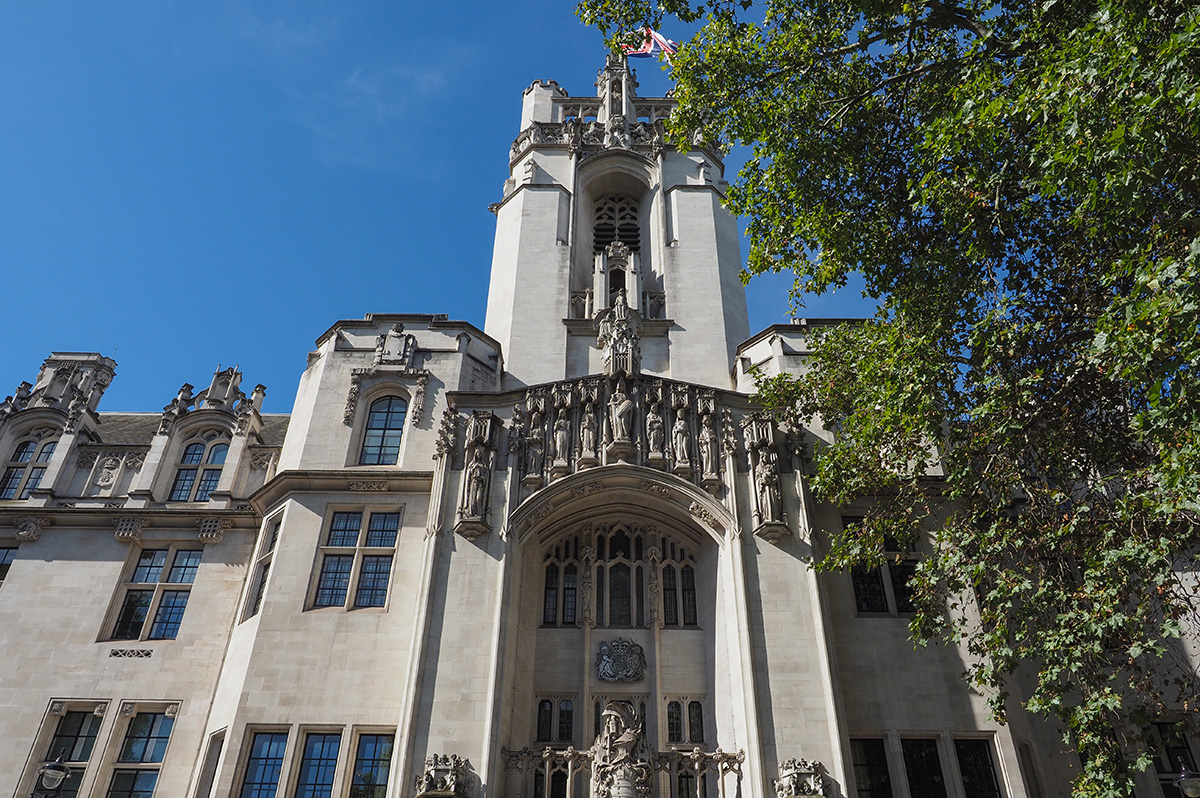
The British Supreme Court on Wednesday ruled the legal definition of a woman is limited to “biological women” and does not include transgender women.
The Equality Act that bans discrimination based on sexual orientation and gender identity took effect in 2010.
Scottish MPs in 2018 passed a bill that sought to increase the number of women on government boards. The Supreme Court ruling notes For Women Scotland — a “feminist voluntary organization which campaigns to strengthen women’s rights and children’s rights in Scotland” — challenged the Scottish government’s decision to include trans women with a Gender Recognition Certificate in its definition of women when it implemented the quota.
Stonewall U.K., a British advocacy group, notes a Gender Recognition Certificate is “a document that allows some trans men and trans women to have the right gender on their birth certificate.”
“We conclude that the guidance issued by the Scottish government is incorrect,” reads the Supreme Court ruling. “A person with a GRC (Gender Recognition Certificate) in the female gender does not come within the definition of ‘woman’ for the purposes of sex discrimination in section 11 of the EA (Equality Act) 2010. That in turn means that the definition of ‘woman’ in section 2 of the 2018 Act, which Scottish ministers accept must bear the same meaning as the term ‘woman’ in section 11 and section 212 of the EA 2010, is limited to biological women and does not include trans women with a GRC.”
The 88-page ruling says trans people “are protected by the indirect discrimination provisions” of the Equality Act, regardless of whether they have a Gender Recognition Certificate.
“Transgender people are also protected from indirect discrimination where they are put at a particular disadvantage which they share with members of their biological sex,” it adds.
Susan Smith, co-founder of For Women Scotland, praised the decision.
“Today the judges have said what we always believed to be the case, that women are protected by their biological sex,” she said, according to the BBC. “Sex is real and women can now feel safe that services and spaces designated for women are for women and we are enormously grateful to the Supreme Court for this ruling.”
Author J.K. Rowling on X said it “took three extraordinary, tenacious Scottish women with an army behind them to get this case heard by the Supreme Court.”
“In winning, they’ve protected the rights of women and girls across the UK,” she added.
It took three extraordinary, tenacious Scottish women with an army behind them to get this case heard by the Supreme Court and, in winning, they’ve protected the rights of women and girls across the UK. @ForWomenScot, I’m so proud to know you 🏴💜🏴💚🏴🤍🏴 https://t.co/JEvcScVVGS
— J.K. Rowling (@jk_rowling) April 16, 2025
Advocacy groups in Scotland and across the U.K. said the ruling is a serious setback for trans rights.
“We are really shocked by today’s Supreme Court decision — which reverses 20 years of understanding on how the law recognizes trans men and women with Gender Recognition Certificates,” said Scottish Trans and the Equality Network in a statement posted to Instagram. “The judgment seems to have totally missed what matters to trans people — that we are able to live our lives, and be recognized, in line with who we truly are.”
Consortium, a network of more than 700 LGBTQ and intersex rights groups from across the U.K., in their own statement said it is “deeply concerned at the widespread, harmful implications of today’s Supreme Court ruling.”
“As LGBT+ organizations across the country, we stand in solidarity with trans, intersex and nonbinary folk as we navigate from here,” said Consortium.
The Supreme Court said its decision can be appealed.
-

 District of Columbia3 days ago
District of Columbia3 days agoReenactment of 1965 gay rights protest at White House set for April 17
-

 Maryland3 days ago
Maryland3 days agoFreeState Justice: Transgender activist ‘hijacked’ Moore’s Transgender Day of Visibility event
-

 Hungary3 days ago
Hungary3 days agoHungarian MPs amend constitution to ban public LGBTQ events
-

 Real Estate4 days ago
Real Estate4 days agoNavigating DMV real estate market during political unrest



